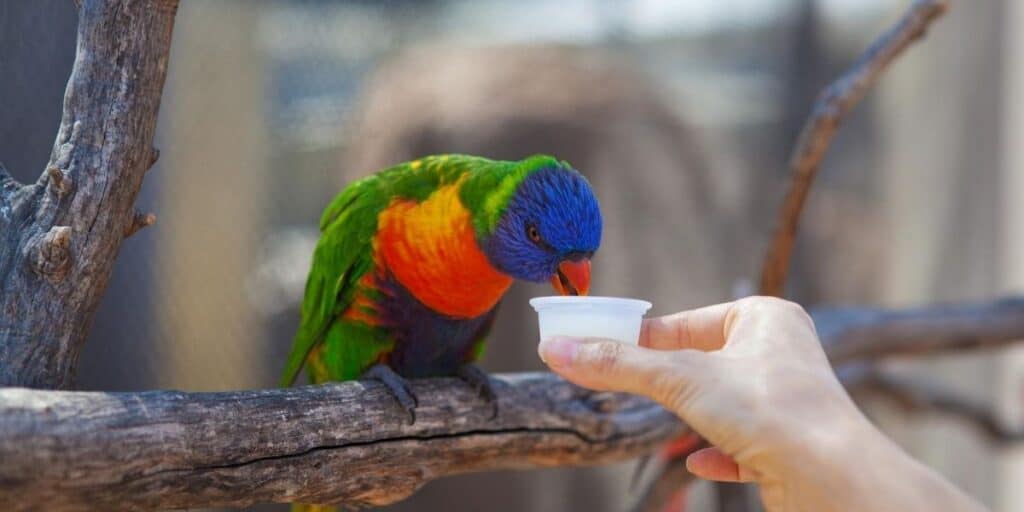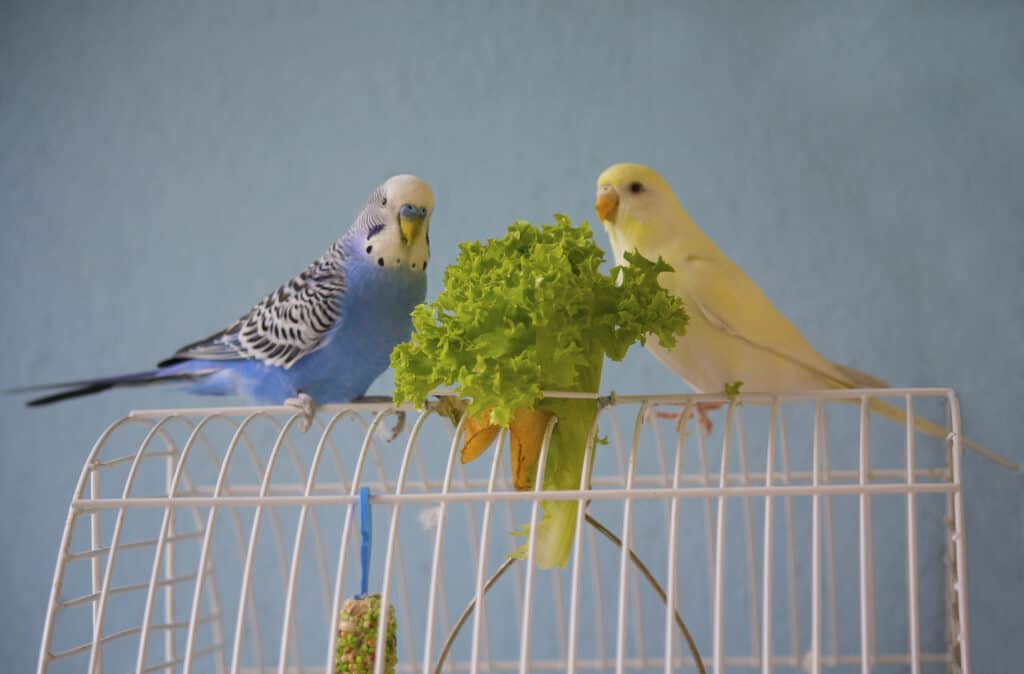If we conduct a popularity contest between budgie and cockatiel, it would be impossible to hail only of them as a winner. Both of these bird species are extremely popular as pet parrots. They share a lot of common traits and differences between them. But their diet in not exactly the same.
Budgies and cockatiels can eat the same bird seeds but the amount of sunflower seeds found in most cockatiel foods will not be suitable for your budgies. A general bird mix with fewer sunflower seeds is ideal for both birds. Mix this will fruits and vegetables and the odd treat and you’ll have a balanced diet for your birds.
But first, let’s start with:
Table of Contents
Can Budgies and Cockatiels Eat the Same Food?
For starters, budgies and cockatiels are both medium-sized birds with similar kind of built and dietary needs.
So, yes, budgies and cockatiels can eat the same food for the most part. When it comes to fruits, veggies, and treats, what’s good for a budgie is good for a cockatiel too and vice versa.
But with seeds, there’s a little twist.
Looking to upgrade your birdcage? Take a look at the NO1 Selling Cage on Amazon ↗️
Can Budgies and Cockatiels Eat the Same Seeds?
If you have several pet birds like budgies and cockatiels, it’s tempting to share the same mix among all your pet birds. After all, the benefits are many—from not having to track different types of mixes to saving a couple of bucks.
Well, good news—budgies and cockatiels can eat the same kinds of seed mixes.
Despite the difference in packaging and labels, the seed mixes marketed for both these birds often include the same ingredients.
However, there’s an exception of one ingredient—sunflower seeds.
Cockatiels are slightly bigger than budgerigars in size. So naturally, their caloric requirement is a bit higher.
That’s why the concentration of sunflower seed can be a bit higher in seed mixes marketed for cockatiels, which is not really recommended for slimmer budgies.
Likewise, the seed mixes made for budgies may not fulfill the nutrient requirements required for a cockatiel.
So, occasionally feeding the same kind of mix is absolutely fine and poses no risks, but you’re better off buying separate seed mixes for both parties.
Health Problems in Budgies and Cockatiels Due to Imbalanced Diet
Not only can budgies and budgies eat the same food, but they also suffer from diseases when their diet is lacking.
These birds may thrive on a primarily seed-based diet in the wild, but we can’t say the same for pet birds. An imbalanced diet can lead to severe health problems and even death in some cases.
Some of the most common diet-induced health problems are:

Fat-related diseases
When it comes to pet birds, owners often don’t put much effort into diet and nutrition.
As a result, your pet parrots can develop serious medical conditions that could have been simply avoided with better nutrition.
Higher fat content in the diet will make your budgies and cockatiels prone to obesity. Although it may seem unlikely, these medium-sized birds can become overweight very easily.
Fatty liver disease among the most prevalent health problems present in budgies and cockatiels.
If the amount of fat that’s going into your bird’s diet isn’t kept on a check, they can also develop lipomas and benign fatty tumors around the crop area, chest, and abdomen.
Thyroid Dysplasia
Iodine deficiency in the diet makes budgies and cockatiels prone to thyroid dysplasia. Once again, if your bird’s diet primarily consists of seeds, the chances of contracting this disease are higher.
In birds suffering from thyroid dysplasia, the thyroid glands press on the trachea and syrinx. As a result, your bird may develop a characteristic squeak when they breathe.
If diagnosed in time, your vet will prescribe an iodine supplement for treatment.
Renal Disease
Renal disease, which is associated with kidneys, is present in budgies and cockatiels that consume a 100% pelleted diet. While pellets should form the biggest part of your pet bird’s diet, nothing is good in excess.
It’s difficult to detect this illness at an early stage. However, the symptoms include anorexia, wet dropping, increased thirst, swollen joints, and puffy abdomen, among others.
Pellet manufacturers often claim that they have reworked on the formula to prevent renal disease. Still, vets advise that pellets shouldn’t make up more than 50% of your bird’s diet.

So, What Should Budgies and Cockatiels be Fed for a Balanced Diet?
When it comes to ensuring a balanced diet, budgies and budgies have similar kinds of dietary needs.
They need a well-rounded food regime that can deliver vitamins, minerals, protein, carbs, and essential amino acids.
Their diet should include the following food items:
Pellets

The most commonly recommended base for the pet bird’s diet is formulated pellets.
It is because pellets are manufactured to be a balanced and nutritionally complete food. This food is fortified with the right amounts of fat, vitamins, and minerals to keep your birds healthy.
However, pellets should only form about 50-60% of your bird’s diet. Otherwise, your birds bear the risk of complications like renal disease.
Seeds

Both species of birds are granivores and ground feeders. As a result, they’re both inclined towards eating seeds as the main part of their diets.
Different types of seeds that are safe for both budgies and budgies are:
- Canary
- Safflower
- Millet Spray
- Buckwheat
- Oat
- Groats
However, seeds lack certain amino acids, vitamins, and minerals these parrots need. Likewise, seeds are high in fat, which is unhealthy for birds.
That’s why seeds should never be served as the portion of your budgie and budgie’s diet. Most guidelines state that 1.5-2 teaspoons of seed mix are enough for a single bird.
Note: Unlike budgerigars or other species of budgies, cockatiels can be picky about the seeds they consume. Often, they will only eat 1 or 2 types of their favorite seeds.
Fruits and Vegetables
Fruits and vegetables are essential to fulfill the nutrient needs of your birds.
Fruits safe for both budgies and budgies are (but not limited to:
- Strawberries
- Bananas
- Apples
- Guavas
- Papayas
- Kiwi
- Blueberries
- Nectarines
Vegetables safe for both budgies and budgies are (but not limited to:
- Carrots
- Pumpkin
- Lettuce
- Broccoli
- Beet greens
- Kale
- Spinach
- Beans
- Mustard Greens
The general rule of thumb is that you should give about ½ to ¾ cup of fruits and veggies to your pet parrot every day. Remember not to give canned produce as they are high in preservatives and added sugar.
Important: While most staple fruits are good for your budgies and cockatiels, avocados should be completed avoided.
This fruit is high in persin, which is poisonous for these birds and can even prove fatal.
Nuts
You can also nut to your budgie and cockatiel’s diet in the form of occasional treats.
While nuts are safe food for parrots, they’re very high in fat content and should only be given sparsely.
Nuts safe for both budgies and cockatiels are (but not limited to):
- Pecan
- Pistachios
- Almonds
- Walnuts
- Peanuts
- Grape nuts
Suitable Bird Foods
Final Thoughts
So, can budgies and budgies eat the same food? They definitely can, for most parts.
Seed mixes for these two birds can be different as cockatiels require a tad bit high-calorie diet compared to budgies. However, when it comes to pellets, fruits, vegetables, and nuts, they can pretty much eat the same things in the same quantities.
It’s just not the dietary needs that are similar. If their diet isn’t well-balanced, budgies and cockatiels are also vulnerable to the same health problems. That’s why it is crucial to make sure that their diet is diverse and fortified with all the necessary nutrients required to promote a healthy bird.











